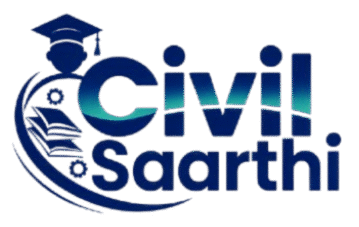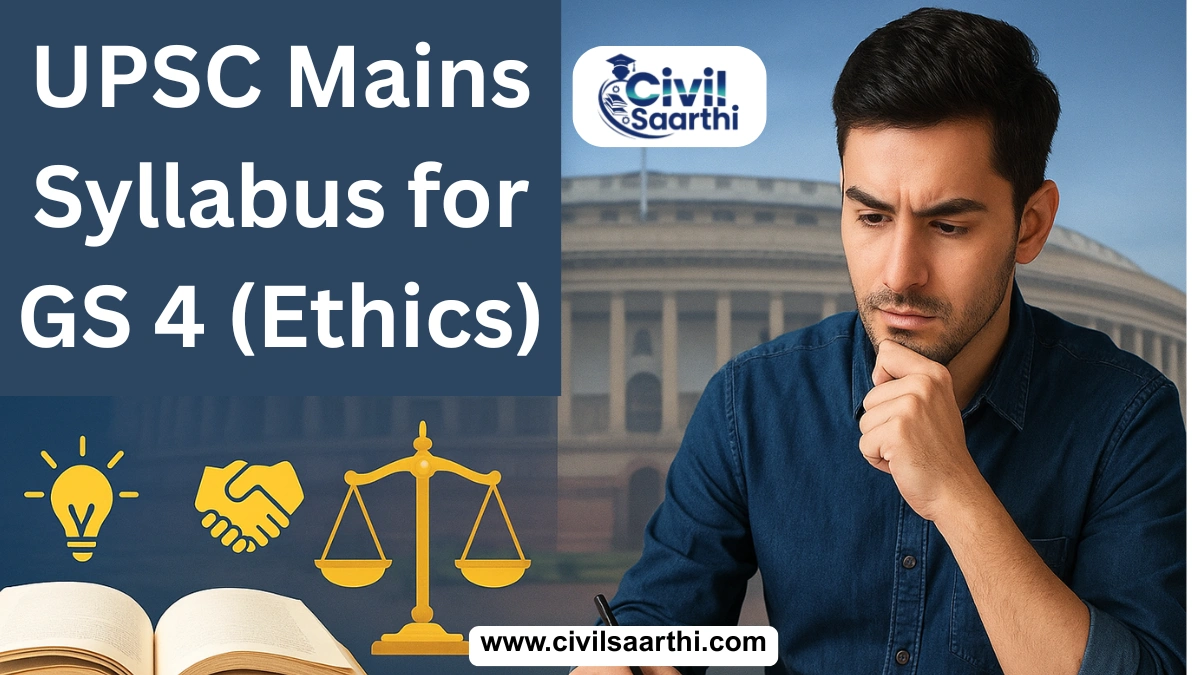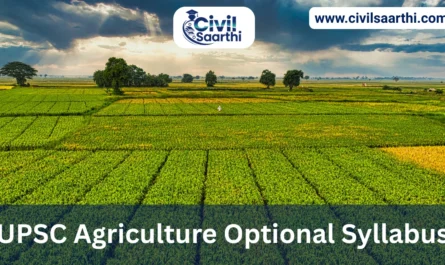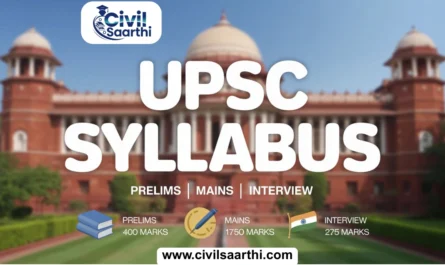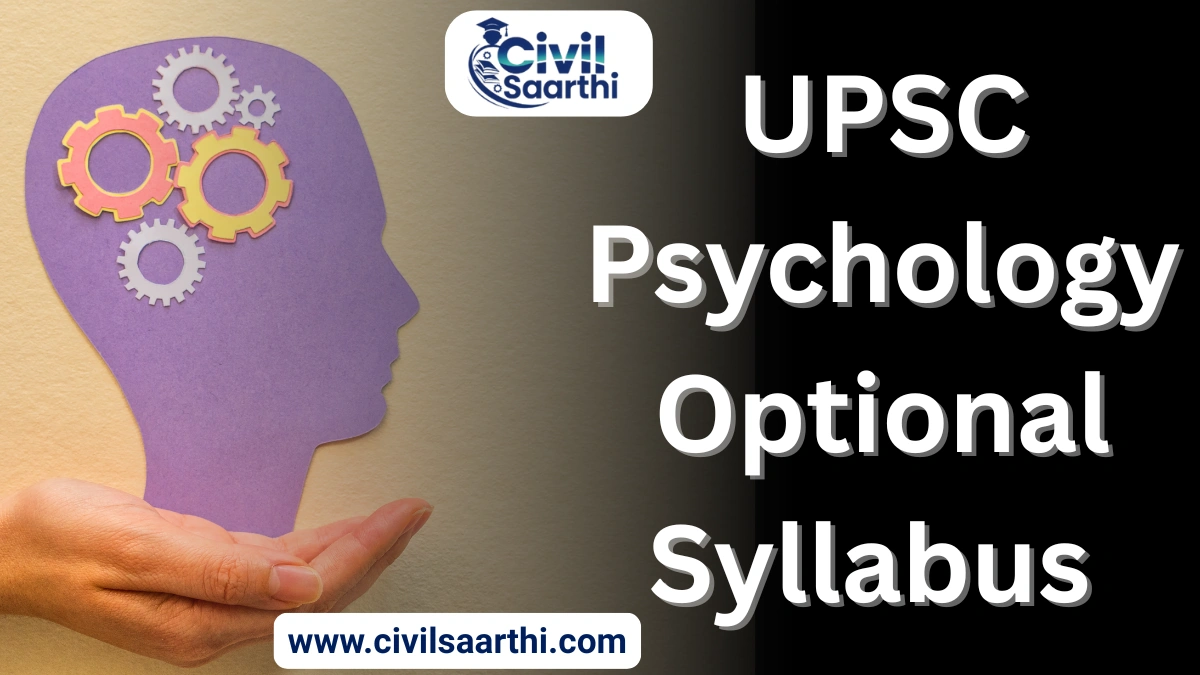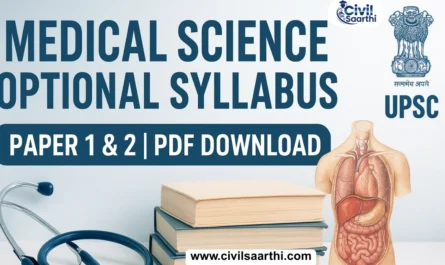The UPSC Mains Syllabus 2025 for GS 4 focuses on assessing a candidate’s ethical and moral dimensions in public administration. This paper evaluates the aptitude, integrity, and problem-solving approach of aspirants when faced with dilemmas and challenges in governance and public service. The syllabus ensures aspirants are not just knowledgeable but also principled and empathetic decision-makers. The detailed syllabus has been discussed below in the article.
UPSC Mains Syllabus 2025 for GS 4
The UPSC Mains Syllabus 2025 for GS 4 centers on ethics, integrity, and aptitude, aiming to evaluate a candidate’s moral compass and problem-solving ability in real-life administrative scenarios. This paper tests how future civil servants would respond to ethical dilemmas, value-based decisions, and challenges in governance. It covers a range of topics like emotional intelligence, public service values, probity in governance, contributions of moral thinkers, and also includes case studies to assess practical application.
UPSC Mains Syllabus 2025 for GS 4: PDF Download
The UPSC Mains GS Paper 4 (Ethics, Integrity & Aptitude) Syllabus 2025 PDF provides a complete outline of topics such as ethics and human interface, attitude, emotional intelligence, probity in governance, and case studies. It is a handy resource for aspirants to keep the syllabus accessible during preparation and revision. The link to download the syllabus PDF has been shared below.
Click here to download UPSC Mains Syllabus 2025 PDF
UPSC Mains Syllabus 2025 for GS 4 Official
General Studies- IV: Ethics, Integrity and Aptitude
- This paper will include questions to test the candidates’ attitude and approach to issues relating to integrity, probity in public life and his problem solving approach to various issues and conflicts faced by him in dealing with society. Questions may utilise the case study approach to determine these aspects. The following broad areas will be covered:
- Ethics and Human Interface: Essence, determinants and consequences of Ethics in-human actions; dimensions of ethics; ethics – in private and public relationships. Human Values – lessons from the lives and teachings of great leaders, reformers and administrators; role of family society and educational institutions in inculcating values.
- Attitude: content, structure, function; its influence and relation with thought and behaviour; moral and political attitudes; social influence and persuasion.
- Aptitude and foundational values for Civil Service, integrity, impartiality and non-partisanship, objectivity, dedication to public service, empathy, tolerance and compassion towards the weaker-sections.
- Emotional intelligence-concepts, and their utilities and application in administration and governance.
- Contributions of moral thinkers and philosophers from India and the world.
- Public/Civil service values and Ethics in Public administration: Status and problems; ethical concerns and dilemmas in government and private institutions; laws, rules, regulations and conscience as sources of ethical guidance; accountability and ethical governance; strengthening of ethical and moral values in governance; ethical issues in international relations and funding; corporate governance.
- Probity in Governance: Concept of public service; Philosophical basis of governance and probity; Information sharing and transparency in government, Right to Information, Codes of Ethics, Codes of Conduct, Citizen’s Charters, Work culture, Quality of service delivery, Utilization of public funds, challenges of corruption.
- Case Studies on above issues.
UPSC Mains Syllabus 2025 for GS 4: Detailed
The UPSC Mains GS Paper 4 (Ethics, Integrity and Aptitude) Syllabus 2025 focuses on ethics and human interface, including the essence, determinants and consequences of ethical behavior, along with the role of human values in decision-making. It covers attitude, its structure, content and influence on thought and behavior along with social influence, persuasion and relation to morality. The syllabus also highlights aptitude and foundational values of civil services such as integrity, impartiality, empathy, compassion, tolerance, and dedication to public service, with applications in real-life governance.
1. Ethics and Human Interface
This section of the UPSC Mains Syllabus 2025 for GS 4 delves into the fundamental aspects of ethics and their application in human interactions. It emphasizes understanding the essence, determinants, and consequences of ethical behavior in both private and public relationships.
Key Areas:
- Essence of Ethics
- Determinants and Consequences of Ethics in Human Actions
- Dimensions of Ethics
- Ethics in Private and Public Relationships
- Human Values – Lessons from the Lives and Teachings of Great Leaders, Reformers, and Administrators
- Role of Family, Society, and Educational Institutions in Inculcating Values.
2. Attitude
The UPSC Mains Syllabus 2025 for GS 4 includes the study of attitude, its components, and its influence on behavior. Understanding attitude is crucial for civil servants to navigate complex social and political environments effectively.
Key Areas:
- Content, Structure, and Function of Attitude
- Influence and Relation with Thought and Behaviour
- Moral and Political Attitudes
- Social Influence and Persuasion
3. Aptitude
Aptitude in the UPSC Mains Syllabus 2025 for GS 4 refers to the inherent qualities and values essential for civil services. This section assesses the foundational values that guide a civil servant’s actions and decisions.
Key Areas:
- Aptitude and Foundational Values for Civil Service
- Integrity
- Impartiality and Non-partisanship
- Objectivity
- Dedication to Public Service
- Empathy, Tolerance, and Compassion towards the Weaker Sections.
4. Emotional Intelligence
Emotional Intelligence (EI) is a significant component of the UPSC Mains Syllabus 2025 for GS 4, focusing on the ability to understand and manage emotions effectively. EI is vital for administrators to handle interpersonal relationships judiciously and empathetically.
Key Areas:
- Concepts of Emotional Intelligence
- Utility and Application of EI in Administration and Governance
5. Moral Thinkers and Philosophers
This part of the UPSC Mains Syllabus 2025 for GS 4 encourages candidates to study the contributions of moral thinkers and philosophers. Their teachings provide valuable insights into ethical conduct and decision-making.
Key Areas:
- Contributions of Moral Thinkers and Philosophers from India and the World
6. Public/Civil Service Values and Ethics in Public Administration
The UPSC Mains Syllabus 2025 for GS 4 emphasizes the importance of ethics in public administration. It covers various ethical concerns and dilemmas that civil servants may encounter in their professional lives.
Key Areas:
- Status and Problems of Public/Civil Service Values
- Ethical Concerns and Dilemmas in Government and Private Institutions
- Laws, Rules, Regulations, and Conscience as Sources of Ethical Guidance
- Accountability and Ethical Governance
- Strengthening of Ethical and Moral Values in Governance
- Ethical Issues in International Relations and Funding
- Corporate Governance
7. Probity in Governance
Probity in governance is a critical aspect of the UPSC Mains Syllabus 2025 for GS 4, focusing on the principles of integrity and transparency in public service. This section addresses the mechanisms to ensure ethical conduct in governance.
Key Areas:
- Concept of Public Service
- Philosophical Basis of Governance and Probity
- Information Sharing and Transparency in Government
- Right to Information
- Codes of Ethics and Codes of Conduct
- Citizen’s Charters
- Work Culture and Quality of Service Delivery
- Utilization of Public Funds
- Challenges of Corruption
8. Case Studies
The UPSC Mains Syllabus 2025 for GS 4 includes case studies to assess the practical application of ethical principles. Candidates are presented with real-life scenarios to evaluate their problem-solving and decision-making skills.
Key Areas:
- Case Studies based on the above topics to test the practical application of ethics, integrity, and problem-solving skills.
UPSC Mains Syllabus 2025 for GS 4: Booklist
The best books for UPSC Mains GS Paper 4 (Ethics, Integrity & Aptitude) 2025 include Lexicon for Ethics, Integrity & Aptitude, Subba Rao’s Ethics, Integrity & Aptitude, and Daniel Goleman’s Emotional Intelligence. Along with these, 2nd ARC Reports, IGNOU Ethics notes, and case study compilations from Vision IAS or Lukmaan IAS are highly useful for conceptual clarity and practice.
| UPSC Mains Syllabus 2025 for GS 4: Booklist | ||
| Topic | Recommended Books/Resources | Why Useful |
| Ethics & Human Interface | Lexicon for Ethics, Integrity & Aptitude by Chronicle | Standard book covering basic definitions, concepts, and thinkers. |
| Ethics & Human Interface | Ethics, Integrity & Aptitude by Subba Rao & P.N. Roy Chowdhury | Detailed explanations with examples, useful for conceptual clarity. |
| Attitude & Emotional Intelligence | Emotional Intelligence by Daniel Goleman | Classic book for understanding EI and its administrative applications. |
| Aptitude & Foundational Values | 2nd ARC Report – Ethics in Governance | Official government report, very useful for practical examples. |
| Contributions of Thinkers | IGNOU Ethics Material (PDFs) | Concise coverage of Indian and Western moral philosophers. |
| Public Service Values | Ethics, Integrity & Aptitude by Lukmaan IAS (study material/notes) | Case-based coverage, aligns with UPSC demand. |
| Probity in Governance | 2nd ARC Report – Citizen-Centric Governance, Code of Ethics | Covers transparency, accountability, RTI, citizen charters. |
| Case Studies | Lexicon (case studies section) + Vision IAS/Lukmaan IAS Case Study compilations | Provides practical scenarios to practice ethical decision-making. |
UPSC Mains Syllabus 2025 for GS 4: Preparation Tips
The preparation for UPSC Mains GS Paper 4 (Ethics) 2025 requires conceptual clarity, structured answer writing, and regular case study practice.
- Understand the Syllabus & PYQs: Go through previous year questions to identify recurring themes and types of case studies.
- Build Conceptual Clarity: Study basics from Lexicon or Subba Rao and refer to 2nd ARC reports for authentic content.
- Practice Answer Writing: Focus on structuring answers with definitions, examples, and clear conclusions.
- Master Case Studies: Regularly solve case studies and practice balanced, practical solutions.
- Use Examples & Thinkers: Quote leaders, philosophers, and real-life civil servants to enrich answers.
- Make Notes of Quotes & Values: Keep short notes of definitions, key terms, and ethical values for quick revision.
- Revise with Mock Tests: Attempt sectional tests to improve time management and presentation.
UPSC Mains Syllabus 2025 for GS 4 FAQs
What is the focus of the UPSC Mains Syllabus 2025 for GS 4?
The UPSC Mains Syllabus 2025 for GS 4 focuses on assessing a candidate’s ethical and moral dimensions in public administration.
Does the UPSC Mains Syllabus 2025 for GS 4 include case studies?
Yes, it includes case studies to evaluate practical application of ethical principles.
Are moral thinkers part of the UPSC Mains Syllabus 2025 for GS 4?
Yes, contributions of moral thinkers and philosophers from India and the world are included.
What topics are covered under probity in governance in the UPSC Mains Syllabus 2025 for GS 4?
Topics include public service concepts, transparency, RTI, codes of ethics, and challenges of corruption.
Is emotional intelligence included in the UPSC Mains Syllabus 2025 for GS 4?
Yes, concepts and applications of emotional intelligence in administration are covered.
How important is attitude in the UPSC Mains Syllabus 2025 for GS 4?
Attitude is crucial, focusing on its influence on behavior and decision-making in public service.
What are the foundational values mentioned in the UPSC Mains Syllabus 2025 for GS 4?
Foundational values include integrity, impartiality, objectivity, dedication to public service, empathy, tolerance, and compassion.
